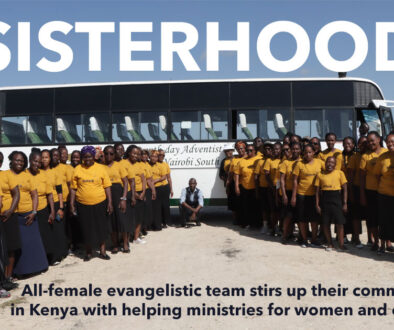Adventist Peace Fellowship Launches New Website and Initiatives
by Adventist Today News Team
The Adventist Peace Fellowship (APF) launched a redesigned website today (August 20), highlighting new avenues for member involvement in local congregations and on university campuses. The APF is a lay-organized nonprofit, which “seeks to raise consciousness about the centrality of peacemaking to the beliefs and heritage of Seventh-day Adventists,” states the APF website.
Though developed by and for the Seventh-day Adventist faith community, the APF “is not officially affiliated, funded, or controlled by the Seventh-day Adventist Church in any way and does not speak on the Church's behalf,” clarifies the agency's website. Rather, as a lay organization, APF invites Adventists and friends of Adventists to join the APF “network and to add their voices and their talents to the work of peace education and advocacy informed by the values of the Adventist tradition.”
The APF originally formed to be “a hub to help Adventists be aware of what other Adventists are doing and saying, to stimulate interest in peace and peacemaking,” Douglas Morgan told Adventist Today in a 2011 interview. Morgan is APF's co-founder, and he was the director from its inception in 2003 until July 2011. He continues by explaining that it was also intended “to connect Adventists with what other people are doing. So we became part of Christian Peace Witness and the National Religious Campaign Against Torture.” Now as the treasurer, Morgan continues to be active in APF leadership while teaching history at Washington Adventist University.
The colorful website is the first visible sign of the organizational changes that Ron Osborn has been leading since he became the executive director in 2011. For instance, campaigns listed on the site reveal the organization's expanded focus. In his first post on the new APF blog, Osborn describes this widening circle of interest. “APF was founded in 2001 with a focus on questions of war and peace in the aftermath of the terrorist attacks of September 11. The organization’s work today encompasses peacemaking in the broadest and most holistic sense of the word, including concern for economic justice, human rights, freedom of conscience, and care for the environment.”
Osborn's first major initiative relates to a new organizational structure—local chapters. “College and university groups, Sabbath school classes, and others can put their commitment to human rights, peacemaking, and social justice into practice by forming their own local chapters of the Adventist Peace Fellowship,” explains the APF website. The process includes organizing a core team, identifying a campaign or issue on which to focus, and getting chartered.
The second initiative, becoming a peace church, is related to the first. This expands the first initiative; rather than have an APF chapter operating within a congregation, the label “peace church” applies to the local congregation as a whole. “The Adventist Peace Fellowship provides a certification program for churches committed to working for peace and justice as an integral part of their identity and mission. In order to fulfill these certification requirements and become part of the Adventist Peace Church network, churches must demonstrate a serious long-term commitment to certain core values and ongoing practical actions in their local communities.”
In addition to providing guidelines for chapter formation and peace church certification, the new website also has an extensive selection of peacemaking resources. A second notable feature is a list of “profiles of more than 60 Adventists or friends of Adventists who have made important contributions to public life through their activism, advocacy, scholarship, and service for peace and social justice,” Osborn reports on the APF blog.
More information can be found at www.adventistpeace.org. The interview with Doug Morgan is here:
www.atoday.org/article/738/features/interviews/2011/douglas-morgan-phd-interview-by-jeff-boyd



